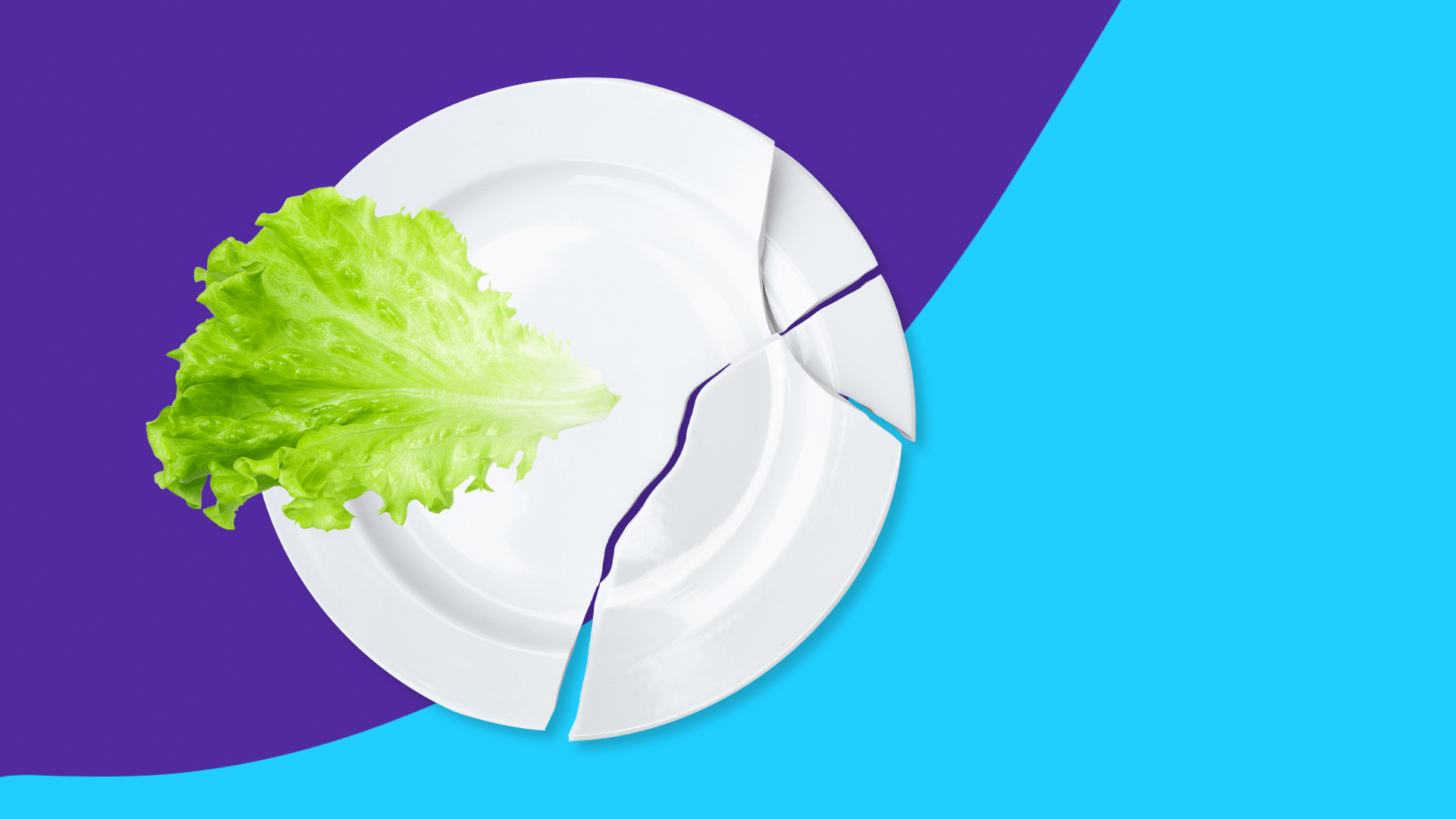Unhealthy body image is common. Often, people see unrealistic beauty standards on TV or social media, and struggle to attain them. That can lead to disordered eating behaviors and crash dieting as people look for easy solutions to manage their weight.
Crash diets involve slashing your calorie intake to achieve dramatic and rapid weight loss. However, they’re usually unsustainable and potentially harmful. But are there safe crash diets that work? Here, experts look at these weight loss methods, explain the dangers of crash dieting, and suggest safer alternatives.
What is a crash diet?
The term “crash diet” isn’t indicative of one specific diet but rather an umbrella term for a style of dieting.
“Crash diets gained their name from the crash that one can experience during and after the diet is completed,” says Brent Agin, MD, a board-certified family medicine physician, author, and founder of Trim Nutrition. “These types of diets are intended to achieve rapid weight loss through drastic reductions in calories and often in conjunction with eliminating at least one of the macronutrients—most commonly carbohydrates.”
The eating behaviors required for crash diets are “an extreme change from what is considered normal,” says Hans Watson, DO, a neuropsychiatrist, diet expert, and author of The Two Rule Diet. “They are not sustainable physically or psychologically.”
This type of dieting often focuses on eating one type of food, and therefore are not nutritionally wholesome. Some examples include:
- Juice cleanses
- The grapefruit diet
- The cabbage soup diet
- The chicken soup diet
- The cottage cheese diet
Does crash dieting work?
While crash diet results may appear impressive, it’s only a short-term fix. “Crash diets will generally result in initial weight loss, but it’s seldom maintained,” Dr. Watson says.
When you cut your calorie intake drastically, you’ll lose weight. But it’s a problematic approach to weight loss that’s all too easily reversed when you become unable to follow the strict rules long-term—and even if you could, it would be unhealthy for a variety of reasons.
Is there a healthy crash diet?
You may be able to crash diet safely, providing you’re only planning on short-term weight loss, perhaps for a vacation or special event. “Crash diets can be deemed safe if they are used infrequently and never for more than 1-2 weeks,” says Dr. Agin. As long as they are short-term, research shows that crash diets can be effective for losing weight. Over longer periods, they can lead to nutritional imbalances that affect bone health, inflammation, and increased uric acid levels.
Typically, though, medical experts do not consider crash diets safe. “Most crash diets neglect proper nutritional and psychological health. There is not a single crash diet out there that I would consider to be safe long-term,” says Dr. Watson. Therefore, the best crash diet tip is to not use a crash diet at all.
What are some dangers of crash diets?
Crash diets are problematic because they promote disordered attitudes about eating, and can cause real health issues if you continue a restrictive eating pattern for more than one to two weeks. Some crash diet dangers include:
- Fatigue
- Stress, caused by rising cortisol levels
- Dehydration
- Headache
- Dizziness
- Dry skin
- Low energy
- Mood changes, like irritability
- Hair loss
- Changes in gastrointestinal motility, like constipation or diarrhea
- The yo-yo effect of weight loss and gain
“The yo-yo effect is very hard physically and mentally and affects the entire body profoundly,” Dr. Watson says. “Eventually, I always see crash dieting individuals end up in a situation where they struggle with weight gain, metabolic diseases like diabetes, and mental health struggles.”
RELATED: Does diabetes cause or prevent weight loss?
What’s the safest diet for weight loss?
Crash diets are not recommended for sustainable weight loss. Instead, it’s better to consult a healthcare professional who can help you find a safe and effective weight loss plan.
“Never compromise your health for weight loss,” Dr. Agin advises. “We have so many diets out there, yet our obesity and overweight statistics keep rising. The only real solution for safe and effective weight loss is creating a lifestyle that is centered on moderation.”
Often, experts recommend the Mediterranean diet, an eating plan that focuses on seafood, lean protein, olive oil, and lots of fruits and vegetables.
Another “popular eating strategy that works well is intermittent fasting,” says Dr. Agin. It’s a diet plan that doesn’t restrict what you eat, just when you eat it. Meaning, you can still have your favorite foods. Plenty of research supports this way of eating for weight loss. Still, there are some demographics that should not use intermittent fasting. Consider working with a dietitian to find the best plan for your lifestyle and health condition.
RELATED: The best diet for weight loss
When should you speak to a doctor?
“If someone is unhappy with their weight, whether it’s overweight or underweight, and they’re struggling to get results, they should seek help,” says Dr. Agin. Your healthcare provider can provide practical weight loss advice. In fact, just talking to a physician could help you lose weight. Research shows that when doctors talk to their patients about their weight, it can prevent further weight gain.
In certain cases, your healthcare provider may even recommend a prescription medication to help. Some individuals may benefit from weight-loss medications, including people with health problems related to obesity or being overweight. The Food and Drug Administration currently approves the following weight-loss medications for people with certain body mass indexes (BMIs):
- Xenical (orlistat)
- Qsymia (phentermine-topiramate)
- Contrave (naltrexone-bupropion)
- Saxenda (liraglutide)
- Wegovy (semaglutide)
- Imcivree (setmelanotide)
However, it’s essential to bear in mind that these medications aren’t ideal for everyone with a high BMI. “There is no magic pill, despite everyone always looking for one,” says Dr. Agin. “You should not stay on weight loss medications long term, as they can directly affect your metabolic output and leave you with rebound weight gain,” he explains. Opting for a lifestyle program that focuses on healthy eating behaviors and encourages physical activity may be the best sustainable solution.
Or, if you find that you are often doing crash diets, and are worried about disordered eating habits, you should schedule an appointment to talk to your physician. Your primary care doctor can help determine what additional treatment steps you might need.
RELATED: Compare Contrave vs. phentermine
Helpful resources
About 30 million Americans live with an eating disorder. If you or a loved one is struggling with an eating disorder, it can feel overwhelming and lonely. But there is help available. You’re not alone. Here are some resources to support your recovery journey:











